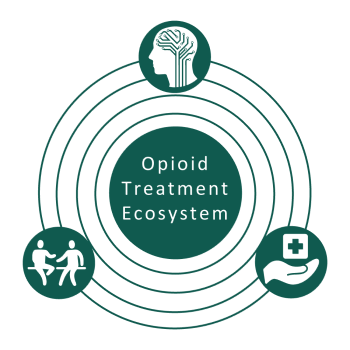The CBHJ is working to address Michigan's Opioid Epidemic through the Treatment Ecosystem Initiative.
In the United States there have been more than a half million deaths in the past decade, with opioids associated with over two-thirds of these deaths, and the age-adjusted overdose death rate in Michigan is almost twice the national average.
The Wayne State University School of Social Work Center for Behavioral Health and Justice Opioid Treatment Ecosystem initiative is a key part of Michigan's response to the overdose epidemic. In cooperation with the Michigan Opioid Partnership, a public-private collaborative that includes the Michigan Department of Health and Human Services and other key funders, the CBHJ is able to provide funding, technical assistance, and evaluation to six counties who are committed to improving the treatment of opioid use disorder for persons booked into jail.
Jackson, Kent, Monroe, Muskegon, Washtenaw, and Wayne County are implementing procedures to screen for opioid use disorder or opioid withdrawal; providing all three medications for opioid use disorder (buprenorphine, methadone, and naltrexone) for those with a current prescription as well as new inductions; and creating a plan to continue treatment in the community following release. Several of these communities are further expanding the ecosystem through pre-arrest diversion programs, peer-recovery supports for the continuity of care post release; and providing naloxone to law enforcement and persons returning to the community following incarceration. The work going on in these communities is trendsetting as they aim to establish best practices that will both reduce the incarceration of persons with a substance use disorder but also reduce the rate of fatal overdose death in Michigan.

In Wayne County, the Detroit Wayne Integrated Health Network (DWIHN) is working with its provider network to connect formerly incarcerated individuals into an array of comprehensive, integrated, evidence-based, trauma informed, and culturally sensitive recovery-oriented services. Through town hall meetings DWIHN is educating the public and bringing awareness to the overdose epidemic. Darlene D. Owens, Director of Substance Use Disorder Initiatives at DWIHN, says that the Opioid Treatment Ecosystem initiative "will help those individuals with an opioid use disorder receive the services they need and step into a program once they are released into the community." Importantly, Wayne County is now providing naloxone to all formerly incarcerated individuals with an opioid use disorder.
Director Owens said "this opioid treatment program is long overdue and will change the lives of many by promoting healthy choices" which is consistent with numerous studies which find providing medications and treatment for opioid use disorder can reduce recidivism and accidental overdose deaths. For example, in Rhode Island, after all correctional facilities across the state adopted similar practices to being done by the Opioid Treatment Ecosystem counties in Michigan, there was a 12% reduction in statewide overdose deaths. More recent studies suggest that if these practices were adopted nationally it could save approximately 4,000 lives per year.

Elizabeth Agius, Associate Director for Research Administration for the Center for Social Work Research at the Wayne State University School of Social Work, is overseeing the evaluation of the Michigan State Opioid Response. She suggests that efforts to expand treatment into criminal/legal systems are "essential to addressing the large treatment gap that exists for substance use disorders. This gap is especially critical for those with opioid use disorders who are incarcerated in jail."
On May 5, 2020 the Center for Behavioral Health and Justice will convene the Opioid Treatment Ecosystem initiative stakeholders for its first summit to discuss barriers and successes in this endeavor and to identify future opportunities to strengthen the ecosystem in their community. We look forward to sharing the lessons learned during the implementation as well as the impact that this initiative is having on the overdose epidemic in Michigan.